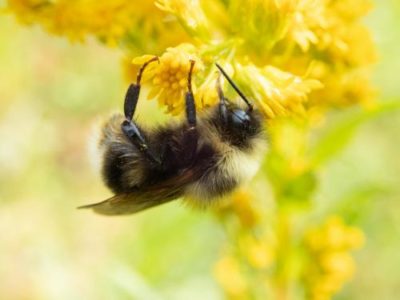Nationwide Buzz Around ‘Bees Are Fish’ Ruling Brought The Daily Show to Stanford Law School
Protecting the environment is serious business for the Environmental Law Clinic, but hilarity ensued when the venerable comedy show came to cover a major win.
Late-night satirical news-comedy program The Daily Show made a beeline to the Stanford Law School (SLS) in fall 2022 to cover a story that had people around the country buzzing with only-in-California commentary.
The stinging headlines on social media and in the traditional press often went something like, “Crazy California Declares Bees are Actually Fish.” Which was true. Sort of.
Recognizing the humor in an otherwise serious story about a major win secured by the Law School’s Environmental Law Clinic, The Daily Show sent reporter Michael Kosta and a crew to the Law School for in-depth interviews and a lot of laughs. Kosta spent several hours with Environmental Law Clinic student Samuel Joyce, JD ’23, and Matthew Sanders, acting deputy director of the Environmental Law Clinic. Due to delays caused by the writer’s strike and other issues, the episode did not air until October 17, 2023.
The source of the story was Almond Alliance of California v. California Fish & Game Commission, which was set in motion in 2018 when nonprofits the Xerces Society for Invertebrate Conservation, Defenders of Wildlife, and the Center for Food Safety petitioned the California Fish and Game Commission to protect four species of native bumble bees. After the Commission indicated the bees might be listed as endangered, a group of farming and industry interests sued, arguing that the Act does not protect insects. Represented by the Environmental Law Clinic, the petitioning nonprofits intervened to defend the Commission’s decision.
It is, in fact, the case that the Act is silent on protection for insects. But the clinic team, led by Joyce at the appellate level, successfully argued on behalf of their nonprofit clients that the Act’s definition of “fish,” which included the term “invertebrates,” encompassed the bumble bees at issue in the case. Joyce worked with, and built on the efforts of, other dedicated clinic students who had worked on the case before him, notably Joseph Ingrao, JD ’21.

The trial court ruled against the Commission and the nonprofit groups, but the Third District Court of Appeal reversed. In a unanimous decision, the appellate court held that the Act does protect invertebrates, including insects like bumble bees, explaining that the Act protects any native “bird, mammal, fish, amphibian, reptile, or plant” at risk of extinction. California law defines “fish” to mean “a wild fish, mollusk, crustacean, invertebrate, amphibian, or part, spawn, or ovum of any of those animals.” Accordingly, the Act protects “invertebrates” as “fish.” The Court of Appeal’s decision became final when the California Supreme Court denied further review in September 2022.
It was a major victory for the Stanford Law team and their clients, not to mention the imperiled pollinators themselves.
“The Daily Show reached out to us to try to tell the story in more detail than what it was getting in the national press,” said Joyce, who is currently clerking on the Alaska Supreme Court and plans on a career in environmental or land use law. “It was all a blur, but they were really funny and they really did put in an effort to try to understand the case and get the facts right while also making it entertaining and understandable to a general audience.”
Sanders acknowledged that the Court of Appeal’s decision might seem strange at first blush. “But that’s only because of how the California Legislature wrote the law,” he said. As he wrote in an article about the case, the decision is actually straightforward. “The Court of Appeal employed long-settled legal doctrines to fairly interpret a single provision in a single law,” Sanders wrote. “Where this case really matters is outside the law,” Sanders continued in his article: it brings critical attention to declining biodiversity, especially among the pollinators and other insects that we depend on for food and healthy ecosystems, “and reminds us that we need every tool available at our disposal to stop and reverse” that trend.
In the Environmental Law Clinic, one of 11 clinics offered by the Law School’s Mills Legal Clinic, students work on cutting-edge legal cases under the supervision of trained clinical faculty. “Through their clinical work, our students acquire the legal skills they need to become the next generation of leaders in their fields,” said Sanders.
And sometimes they also acquire the skills to entertain a national television audience.
Read Joyce’s essay about the case
Read Sanders’ opinion essay
About Stanford Law School
Stanford Law School is one of the nation’s leading institutions for legal scholarship and education. Its alumni are among the most influential decision makers in law, politics, business, and high technology. Faculty members argue before the Supreme Court, testify before Congress, produce outstanding legal scholarship and empirical analysis, and contribute regularly to the nation’s press as legal and policy experts. Stanford Law School has established a model for legal education that provides rigorous interdisciplinary training, hands-on experience, global perspective and focus on public service, spearheading a movement for change.

